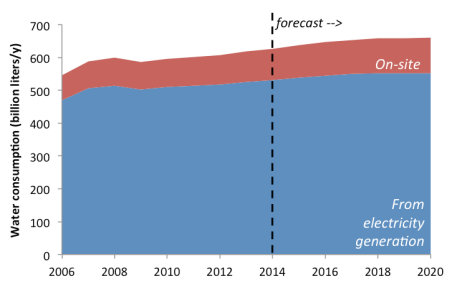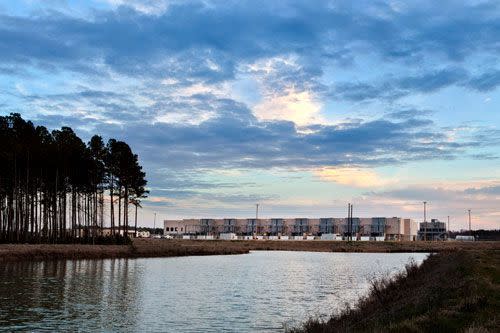Google's data center raises the stakes in this state's 'water wars'

Endless emails, map requests, web searches, and everything else we do online requires the use of energy-hungry, water-guzzling data centers.
For Google, that enormous thirst for water is causing controversy near Charleston, South Carolina, where the tech giant hosts a sprawling data center complex.
Google wants to draw 1.5 million gallons per day from an aquifer to help cool the servers at its facility in Berkeley County. The data center already uses about 4 million gallons of surface water per day, the Post and Courier newspaper reported.
SEE ALSO: This tech giant just hit two impressive clean energy milestones
Some residents, conservationists, and local water utility leaders say South Carolina officials should hold off on granting Google's groundwater request.
The region's aquifers — which contain water that seeps from the surface over decades and centuries — are already strained due to the recent residential and commercial boom.
New industries, corporate farms, and an influx of residents are apparently pumping out water faster than the aquifers can replenish, spurring "water wars" in South Carolina, the newspaper reported.
State and federal scientists are still trying to figure out how much water can be drawn without exhausting the region's groundwater supplies. If that happens, large swaths of the Southeast United States could lose reserve tanks of freshwater, making it harder to endure the region's on-again, off-again droughts.
Google isn't the only tech company to grapple with water issues.
Facebook's data center in Prineville, Oregon competes for freshwater with farmers and a growing local population. In Utah, which just kicked a six-year-long drought, eBay's facility in Salt Lake City uses increasing amounts of water.
The industry's high demand for water has worried some tech investors, particularly in states like California where natural water resources are becoming ever more scarce, Bloomberg previously reported.
Across the country, data centers consumed roughly 626 billion liters of water, or 165 billion gallons, to cool their whirring servers and power their facilities in 2014, according to the Energy Department's Lawrence Berkeley National Laboratory. By 2020, annual water use could rise to about 660 billion liters, or 174 billion gallons.

Image: lawrence berkeley national laboratory
Still, companies have made significant strides in recent years to reduce the environmental impact of their ever-expanding facilities.
Google said its data centers and offices worldwide will get 100 percent of their electricity from wind and solar power plants.
The California tech giant said it also regularly updates and redesigns cooling technologies at its data centers. To cut down on freshwater, some of its facilities use seawater, industrial canal water, recycled "gray" water from sinks and showers, captured stormwater, or harvested rainwater. Other centers don't use water at all and instead rely on outside air cooling.
At its South Carolina data center, a $1.2 billion facility, Google is experimenting with a rainwater retention pond as a source of water to cool its systems.

Image: google
Google said it had studied other water-cooling alternatives for the facility and decided that pumping groundwater was the most readily available solution, according to the company's permit application to the South Carolina Department of Health and Environmental Control.
The Post and Courier said Google has been "tight-lipped" about its operations in Berkeley County, as it has at other centers. Google has a non-disclosure agreement with the county's water and sanitation department, which does not release data about how much water Google uses or how much it pays.
The health department is expected to decide on Google's groundwater permit in May.
Opponents want state officials to wait until the U.S. Geological Survey completes its study on the region's groundwater capacity. That study, due sometime in 2019, could help end what critics have called a "free-for-all" on the state's underground water resources.
